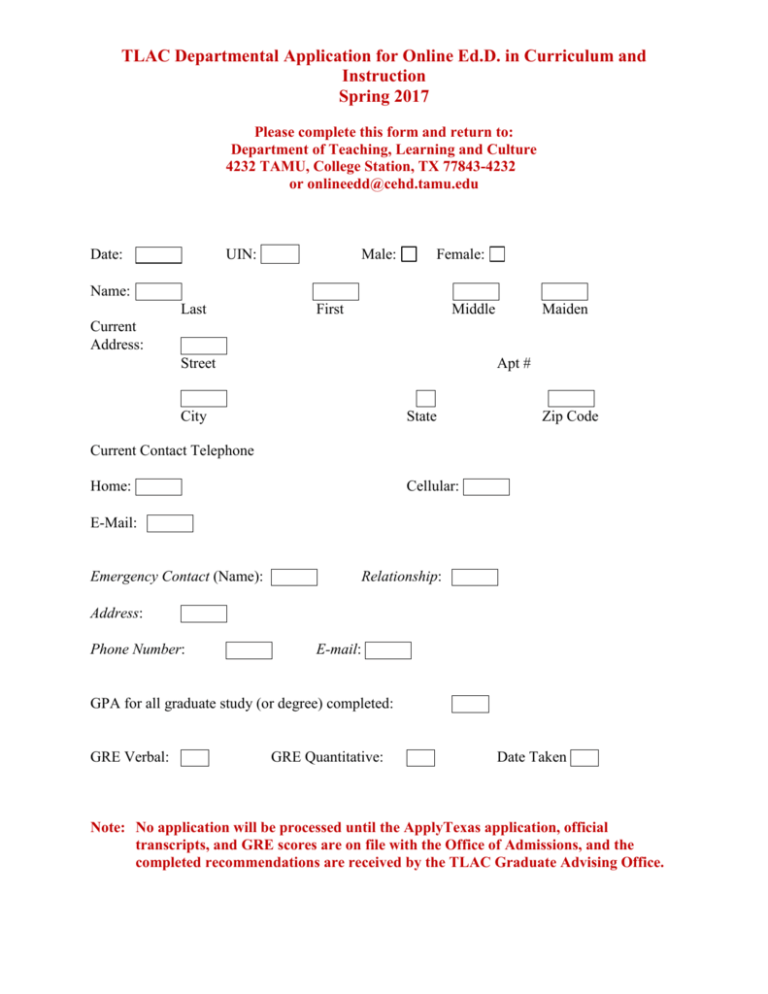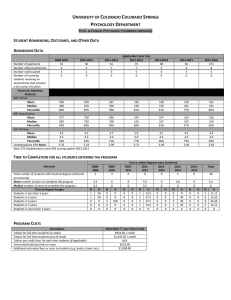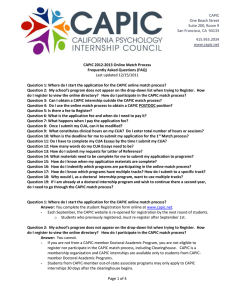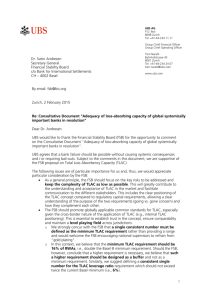Departmental Application - Department of Teaching, Learning and
advertisement

TLAC Departmental Application for Online Ed.D. in Curriculum and Instruction Spring 2017 Please complete this form and return to: Department of Teaching, Learning and Culture 4232 TAMU, College Station, TX 77843-4232 or onlineedd@cehd.tamu.edu Date: UIN: Male: Female: Name: Last First Middle Maiden Current Address: Street Apt # City State Zip Code Current Contact Telephone Home: Cellular: E-Mail: Emergency Contact (Name): Relationship: Address: Phone Number: E-mail: GPA for all graduate study (or degree) completed: GRE Verbal: GRE Quantitative: Date Taken Note: No application will be processed until the ApplyTexas application, official transcripts, and GRE scores are on file with the Office of Admissions, and the completed recommendations are received by the TLAC Graduate Advising Office. Page #2 of 4 Indicate the total number of years you have taught at each level: Level Pre-School Elementary (K-5) Middle School (6-8) High School (9-12) Public School Private School Junior/Community College Four-Year College/University Other (e.g industry, religious) List below: No. of Years What types of professional certifications do you currently hold? What is your career goal following graduation from this program? References Please list three professional references and their contact information. We will email the recommendation link directly to them. Name E-mail Address 1. 2. 3. Please attach your resume/vita, which includes employment, professional presentations, publications, grants, professional certifications/licenses held and participation in professional organizations. Page #3 of 4 Essay Questions Please read the question carefully and note that questions have multiple parts. Your responses will be evaluated holistically by rubric using these four criteria: (1) Focus, (2) Content, (3) Style and Organization, and (4) Mechanics and Format. Employ your best writing skills and include in-text citations to attribute specific ideas to experts. Please follow APA format. Please be sure to answer the following questions on separate pieces of paper. Make sure each document is clearly labeled so the readers know what question you are answering. Submit all of the questions as attachments at the same time you submit the departmental application to onlineedd@cehd.tamu.edu. 1. Describe your personal and professional experiences that have contributed to your current desire to pursue a leadership-focused doctoral degree. Extend the discussion to include the personal and professional aspirations you have for yourself. 2. Discuss your guiding beliefs as an educator. In your response, present WHAT your educational principles are, WHO (including expert sources) has influenced your thinking in shaping your principles, and WHY you adhere to these beliefs. Also provide at least two examples of how your beliefs have guided your practice as an educator. Also explain how you envision these guiding beliefs influencing the leadership you will provide to others. 3. Identify a significant classroom instructional issue, such as the impact of technology on teaching and learning, from the perspective of a classroom teacher. Explain the significance of this issue and describe possible solutions (your ideas and the ideas of experts) for this instructional issue. 4. Select and discuss a significant social issue affecting schools. Explain the significance of this issue and describe possible solutions (your ideas and expert others) for this social issue. 5. The online Ed.D. in C&I in the Department of TLAC requires considerable time for its completion. This question requires you to consider the arrangements you will have to fulfill program requirements while you are still employed. Please consider both items (a) and (b) below, which provide details for estimating the time required for courses and internships to complete the Ed.D. degree. After you have read (a) and (b), please answer the set of the questions appearing after each of them. (a) Time commitment for course work. A standard method for approximating maximum time commitments per week during the school year is to estimate 9 hrs. out of class per week for every one hour of course hour in which you have enrolled. (One 3-hour course = (3x3) hours = 9 hours/week.) For one course during one school year semester, a student would expect to spend about 9 hr/week for 14 weeks = 126 hours. The Ed.D. program requires two courses per Page #4 of 4 semester, which could be approximated as 126 hours x 2 courses = 252 total hours for two classes. Two courses are required every semester, including summers. In the required courses for the summer term, however, the two courses could be scheduled as either 5-week, 10-week, or a combination of the two. The total time commitment for each course would remain the same as a school year course. Over the 10 weeks of the two summer terms, the commitment of 252 total hours would be spread over 10 weeks rather than 14 weeks. If two courses were offered as 10-week courses, you may have to spend as many as 25 hours/week to complete the requirements for both courses. (In a 7-day week, you would estimate 3-4 hours/day; for a 6-day week, you would estimate a little over 4 hours/day.) What potential problem(s) do you foresee for you to fulfill the time commitment for course work for the Ed.D. at this university? If you were selected to be a member of the next cohort of doctoral students pursuing the Ed.D., what steps would you pursue (and with whom) to solve the potential problems you have identified? [Please answer both of these questions completely.] (b) Internship hours. Two 150-hour internships are required in the spring and fall semesters of the third year of the Ed.D. program. The focus of Internship I is on leadership, and a 3-hour course complements the internship activities for this internship. The focus of Internship II is on collecting data to frame your ROS problem. In Internship II, you would be responsibility for arranging your internships with a field-based supervisor who will mentor you as you complete the problem-framing process. On the average, about 10-12 hours per week would be required to complete the internship, which could average two to two and a half hours per day. As the hours cannot be part of your regularly assigned occupational duties, many times an intern must make an arrangement with his/her supervisor to use lunch periods, flexible scheduling, and/or time before or after school to complete the hours required. What potential problem(s) do you foresee in fulfilling the non-negotiable internship requirements for the Ed.D. at this university? If you were selected to be a member of the next cohort of doctoral students pursuing the Ed.D., what steps would you pursue (and with whom) to solve the potential problems you have identified? [Please answer both of these questions completely.]









